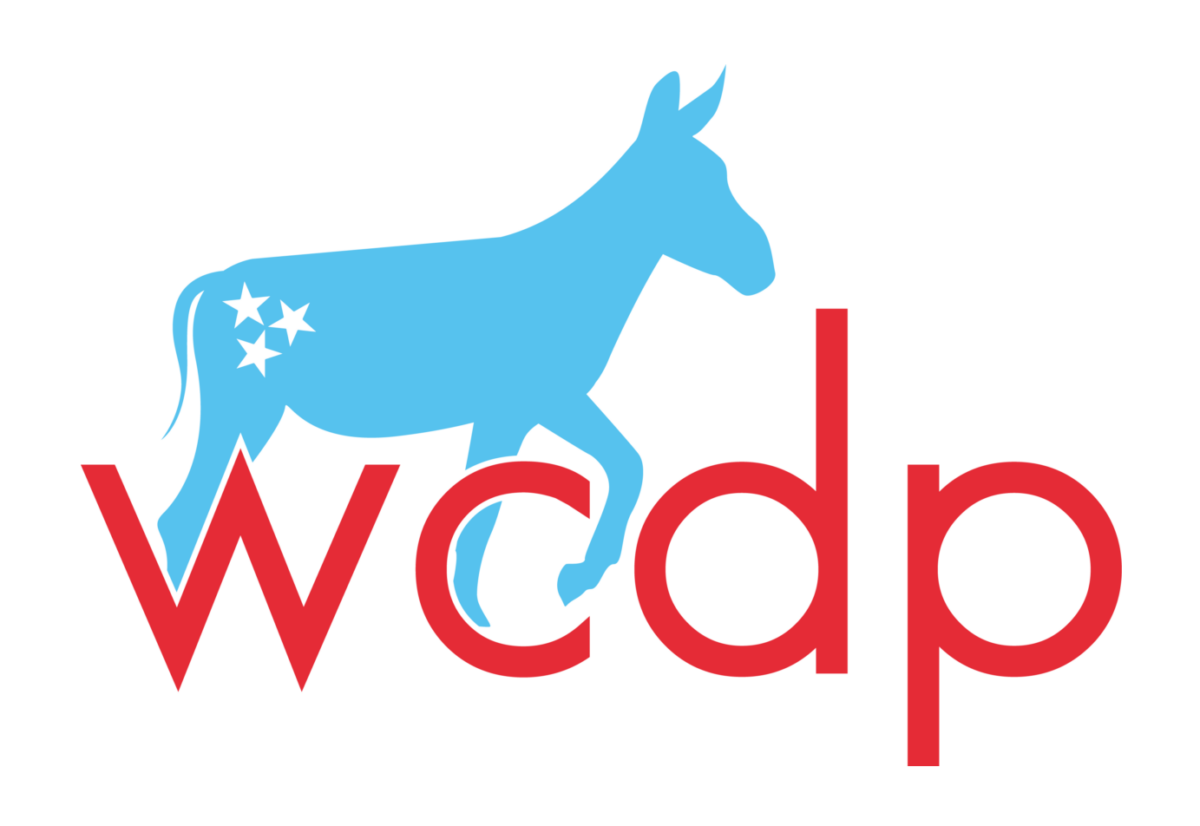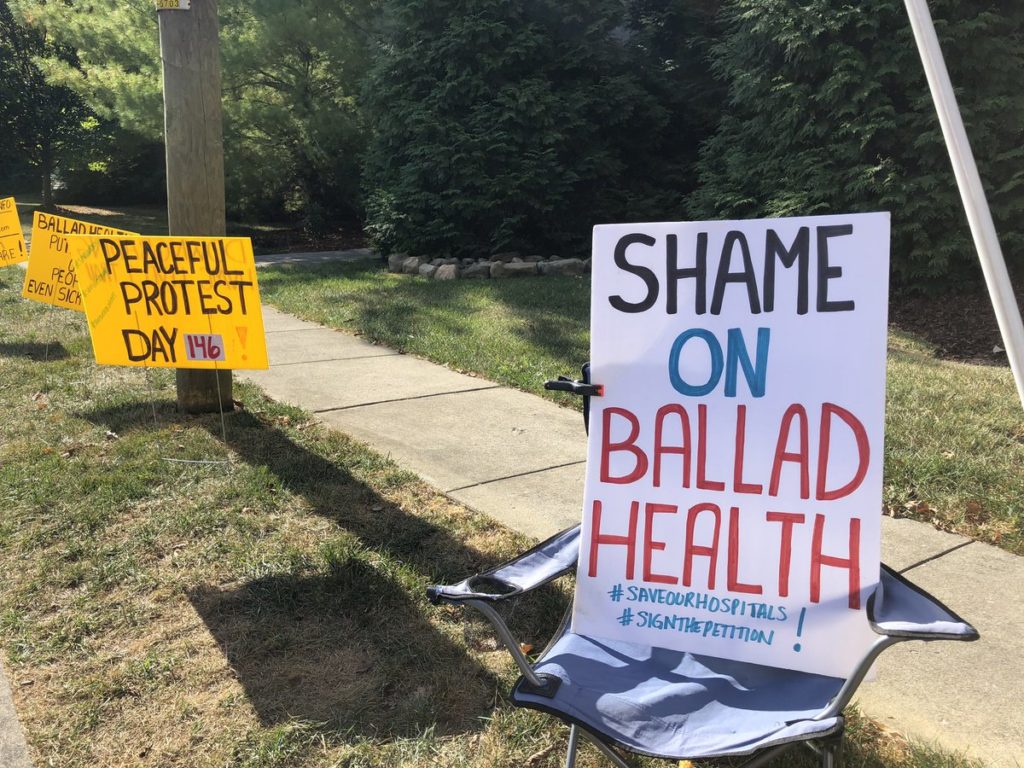Opinion Piece by Chair Kate Craig
 Ballad Health is developing quite a reputation for bullying anyone who speaks out about their policies and practices as well as how the medical monopoly is negatively impacting the community’s access to healthcare. Last week, national news outlets ran stories on how Ballad Health was seeking federal charges against Dani Cook, a disabled veteran who is using her voice to speak out against the healthcare monopoly. All over an alleged $1,300 worth of dead grass as a result of canopies used during the public protest on a public right of way.
Ballad Health is developing quite a reputation for bullying anyone who speaks out about their policies and practices as well as how the medical monopoly is negatively impacting the community’s access to healthcare. Last week, national news outlets ran stories on how Ballad Health was seeking federal charges against Dani Cook, a disabled veteran who is using her voice to speak out against the healthcare monopoly. All over an alleged $1,300 worth of dead grass as a result of canopies used during the public protest on a public right of way.
For over six months, Dani Cook has lead the charge, raising awareness on the unethical practices from Ballad Health— from antitrust violations to reducing access to patient care through the consolidation of services. She’s traveled to Washington, D.C. and gotten the attention of the Federal Trade Commission who is now studying Ballad for their billing practices as a result of the June 2019 COPA Workshop Cook and others attended. The FTC stated that the testimony and public comments from the workshop shaped the scope of the study. Not to forget she has collected over 28,000 local signatures on a citizen petition protesting Ballad’s conduct. Dani Cook is a hero.
And now, it seems Ballad has turned to the Kingsport Board of Mayor and Alderman for help in removing Cook and the rest of the protesters. The proposed ordinance would prohibit structures from being placed on public right of ways. The elected officials supporting the ordinance claim it is needed to protect the city’s aesthetics and potential cost for right of way maintenance.
At the recent Kingsport Board and Alderman meeting, Dani Cook labeled the ordinance as, “a declaration of war on our peaceful protest.” And she’s right. This is nothing more than the move of a bully to silence the voice of the people.
But this isn’t just a Kingsport issue. Nor is it a Johnson City issue. This issue affects an area larger than the state of New Jersey, it includes Northeast Tennessee, Southwest Virginia, and Eastern Kentucky. And Dani Cook’s protest is giving voice to each and every person negatively impacted by this merger, having no other choice than to seek medical services at Ballad Health because it has secured a monopoly through paying off politicians.
For example, it is completely unethical that Tennessee Senator Rusty Crowe has been on Ballad Health’s payroll while simultaneously writing the law that enabled Ballad Health to form despite warnings from the Federal Trade Commission.
It’s no wonder citizens are screaming to get money out of politics.
 Dani Cook isn’t the only person Ballad has bullied. Dr. Starla Kiser, candidate for Virginia House of Delegates in 2019 in Southwest Virginia, spoke out about Ballad’s practices during her campaign. On August 20, 2019, Ballad Health sent her a 10-page letter requesting that she retract her opinion piece published in the Bristol Herald Courier. This same 10-page letter was also sent by Ballad to her opponent as an intimidation tactic.
Dani Cook isn’t the only person Ballad has bullied. Dr. Starla Kiser, candidate for Virginia House of Delegates in 2019 in Southwest Virginia, spoke out about Ballad’s practices during her campaign. On August 20, 2019, Ballad Health sent her a 10-page letter requesting that she retract her opinion piece published in the Bristol Herald Courier. This same 10-page letter was also sent by Ballad to her opponent as an intimidation tactic.
But Dr. Kiser didn’t stand down and throughout her campaign continued to highlight ways in which Ballad was hurting patients in Southwest Virginia.
After my guest commentary published in the Johnson City Press on August 15, 2019, Maybe Rural Voters Wanted Something Else, I received an email from an Executive Assistant at Ballad Health to schedule a meeting with Vice President Tony Keck and Vice President Andy Hall. Upon asking what the meeting was pertaining to, this was the response, “After reading your op-ed, Tony wanted to discuss with you what Ballad Health is doing for rural health access and answer any questions you might have.”
Anyone who has a voice and is using it to speak out against Ballad and their unethical practices that are hurting patients faces intimidation from the medical monopoly.
Healthcare workers are scared because they need jobs, yet Ballad is the number one and only healthcare system employer in this region. Patients are scared because they need access to healthcare and don’t want to be denied simply because they spoke out with concerns about their limited choices and rising healthcare costs. I’m a chronic pain patient who had three surgeries in a Ballad Health facility in 2018. Like every other patient, I have no other options.
The New York Times published a piece on November 8, 2019, With Medical Bills Skyrocketing, More Hospitals Are Suing for Payment. This investigative piece found that 44,000 patients were sued by Ballad Health since 2009, with the number of patients each year steadily increasing. In 2018, 6,700 total cases were filed by Ballad Health. Despite the increasing healthcare costs through higher deductibles and practices where Ballad reduces services or moves services inside a hospital (at a higher cost), Vice President Tony Keck’s response was, “We’re a health care system that has to pay bills.”
Yes, hospitals do have to pay their staff and other administrative costs. But in fiscal year 2019, according to Becker’s Hospital CFO Report, Ballad Health reported a profit of $36.5 million. This is an increase from the $9.9 million reported in fiscal year 2018.
Ballad Health is able to pay their bills and then some, continuing to prioritize lining their own pockets over patient care. On June 12, 2017, before the merger, WJHL reported that Mountain States Health Alliance CEO (now Ballad Health CEO) Alan Levine earned a salary of $1.3 million with an additional $134,090 in bonuses 2015. It wouldn’t be a stretch to assume his salary has continued to increase while employees and patients have their salaries docked to pennies from court judgements so Ballad Health can collect its medical debt.
 Yet Ballad Health continues to push forward despite public outcry. In the September 2019 minutes from the ETSU Board of Trustees meeting, ETSU President Brian Noland calls for a joint meeting between the Ballad Health Board of Directors and the ETSU Board of Trustees. Even though Noland was named as a Ballad Health Board Member in the federal antitrust lawsuit filed in April 2019 that is still waiting to be heard and despite a Federal Trade Commission study into Ballad Health’s billing practices, Noland has openly advocated for this joint meeting while simultaneously stating that to his knowledge ETSU’s Medical School has the only Memorandum of Understanding with Ballad Health.
Yet Ballad Health continues to push forward despite public outcry. In the September 2019 minutes from the ETSU Board of Trustees meeting, ETSU President Brian Noland calls for a joint meeting between the Ballad Health Board of Directors and the ETSU Board of Trustees. Even though Noland was named as a Ballad Health Board Member in the federal antitrust lawsuit filed in April 2019 that is still waiting to be heard and despite a Federal Trade Commission study into Ballad Health’s billing practices, Noland has openly advocated for this joint meeting while simultaneously stating that to his knowledge ETSU’s Medical School has the only Memorandum of Understanding with Ballad Health.
Obviously, there should be a partnership between a medical school and local hospitals. Medical students need residency placements, on the job training opportunities, and after graduation employment. However, when there is only one hospital and the medical school also operates medical facilities, it is unethical to price fix and further limit patient choice and healthcare affordability.
No one likes a bully and yet Ballad Health continues to bully the community through their healthcare practices, legislative pushes, as well as scurrilous charges and claims against protesters. I stand with Dani Cook and the protesters working diligently to hold Ballad Health accountable and create open and fair healthcare systems for our region.

